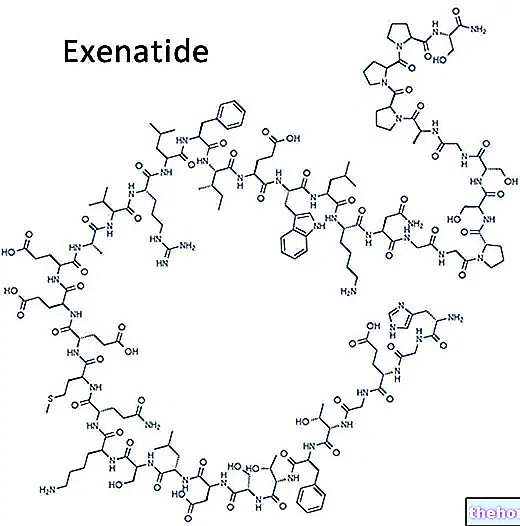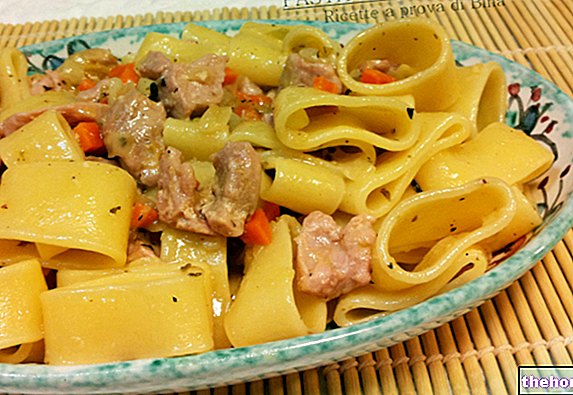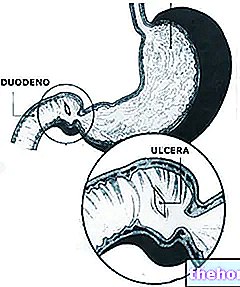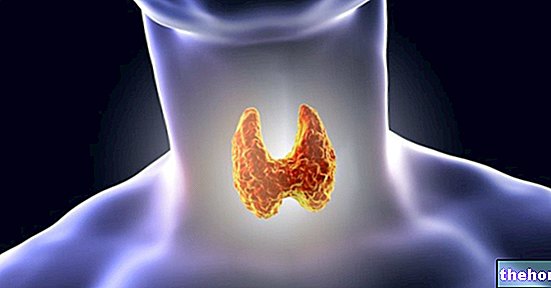GLUCOBAY ® is a drug based on Acarbose
THERAPEUTIC GROUP: Oral antidiabetics

Indications GLUCOBAY ® Acarbose
GLUCOBAY® is indicated in conjunction with an adequate diet in the treatment of type II diabetes mellitus, and in conjunction with insulin therapy in the treatment of type I diabetes.
GLUCOBAY ® mechanism of action Acarbose
GLUCOBAY ® is a drug based on acarbose, a molecule of microbial origin with a tetrasaccharide structure, belonging to the category of alpha glucosidase inhibitors.
Taken orally, the active ingredient of this drug is only minimally absorbed by the systemic circulation, thus concentrating on the intestinal level where it carries out its biological action.
Here, in fact, it is able to selectively inhibit the aforementioned enzymes, normally involved in the digestion of oligo, di and food polysaccharides, thus slowing down the digestion of these sugars and making their absorption slower and more gradual.
It is therefore easy to understand how the therapeutic action of GLUCOBAY ® materializes exclusively in modulating post-prandial glycemic peaks, thus avoiding pathological hyperglycemia, which in any case contributes to the course of diabetic disease and its complications.
Once its action is over, the active ingredient, metabolized by the intestinal flora, is eliminated through the faeces.
Studies carried out and clinical efficacy
1. EFFECTIVENESS OF "ACARBOSE ON" INSULIN SENSITIVITY
J Diabetes Complications. 2011 Feb 28.
Acarbose on insulin resistance after an oral fat load: a double-blind, placebo controlled study.
Derosa G, Maffioli P, D "Angelo A, Fogari E, Bianchi L, Cicero AF.
It is known how fats, and in particular saturated ones and non-esterified fatty acids, can reduce the sensitivity to insulin, reducing the activation capacity of the receptor. This study shows how the intake of acarbose can maintain a good glycemic profile, safeguarding insulin sensitivity (HOMA TEST) after an oral fat load.
2. ACARBOSE AND GLYCEMIC FLUCTUATIONS
Diabetes Technol Ther. 2011 Feb 28.
Evaluation of Efficacy of Acarbose on Glucose Fluctuation and Postprandial Glucose Using Continuous Glucose Monitoring in Type 2 Diabetes Mellitus.
Mori Y, Shiozaki M, Matsuura K, Tanaka T, Yokoyama J, Utsunomiya K.
Meal-induced glycemic fluctuations are particularly important in patients with type II diabetes, contributing significantly to the increase in glycated hemoglobin values and associated complications. The administration of acarbose has been shown to be useful in reducing these fluctuations and concentration of this marker, with the same dietary regimen used.
3. EFFECTIVENESS OF ACARBOSE THERAPY
Diabetes Res Clin Pract. 2011 Jan 18.
International noninterventional study of acarbose treatment in patients with type 2 diabetes mellitus.
Li C, Hung YJ, Qamruddin K, Aziz MF, Stein H, Schmidt B.
Acarbose therapy in about 15,000 patients with type II diabetes ensured a significant reduction in post-prandial glycaemia (from 244 to 172 mg / dl) and in glycated hemoglobin from 8.5% to 7.4%. in just 11 weeks.
Method of use and dosage
GLUCOBAY ® coated tablets of 50 - 100 mg acarbose: although there are reference dosages, especially useful in the initial phase of therapy, such as that of 50 mg three times a day, it is necessary to consult your doctor, who will establish the correct dosage based on the glycemic levels, the diet followed and the style of life maintained.
Similarly, it is important to undergo frequent monitoring of blood glucose, in order to adapt pharmacological and dietary therapy in the best possible way, avoiding nutritional and metabolic imbalances.
GLUCOBAY ® Acarbose warnings
The intake of GLUCOBAY ® should be associated with monitoring of hepatic and renal function in patients with insufficiency of these organs, in order to prevent any side effects.
In order for the therapeutic protocol to be fully effective, it is necessary to combine this with a balanced and low-calorie diet in the case of overweight patients, accompanied by a general improvement in lifestyle.
Immediate suspension of therapy, without first consulting your doctor, could lead to the onset of postprandial hyperglycemia.
On the other hand, it is important to consider that the intake of acarbose could reduce the need for other hypoglycemic agents, therefore it would be advisable to periodically measure the blood sugar and possibly correct the therapeutic plan used.
PREGNANCY AND BREASTFEEDING
The absence of studies on the effects of acarbose on the health of the fetus and the infant does not allow its use during pregnancy and lactation.
For this reason, hyperglycemia in pregnancy must be treated with more effective and more characterized drugs such as insulin.
Interactions
The low systemic absorption of acarbose significantly reduces the risk of interactions potentially dangerous for the patient's health.
However, it is necessary to remember that diets rich in sugars could be associated with annoying gastro-intestinal side effects, due to the excessive fermentation of these nutrients by the commensal flora following the lack of absorption and intestinal accumulation of saccharides.
It is also necessary to remember that during combined therapies with other hypoglycemic agents, any glycemic drops cannot be effectively compensated by the administration of oral sucrose, given the delayed absorption induced by the drug.
Digestive enzymes, intestinal adsorbents and cholestyramine could alter the therapeutic efficacy of GLUCOBAY ®
Contraindications GLUCOBAY ® Acarbose
GLUCOBAY ® is contraindicated in cases of chronic enteropathies and impaired digestion and absorption, celiac disease, intestinal obstructions or ulcerations and severe renal insufficiency.
The drug is also contraindicated in case of hypersensitivity to the active substance or to one of its excipients and during the period of pregnancy and lactation.
Undesirable Effects - Side Effects
Clinical trials and post-marketing monitoring have underlined the good safety and tolerability profile of acarbose, denouncing side effects that are clinically few and concentrated at the level of the gastrointestinal tract.
Nausea, flatulence, diarrhea and abdominal pain were in fact the most documented adverse reactions, while liver pathologies and allergic-based dermatological reactions were described only in rare cases.
Note
GLUCOBAY ® can only be sold under medical prescription.
The information on GLUCOBAY ® Acarbosio published on this page may be out of date or incomplete. For a correct use of this information, see the Disclaimer and useful information page.




























